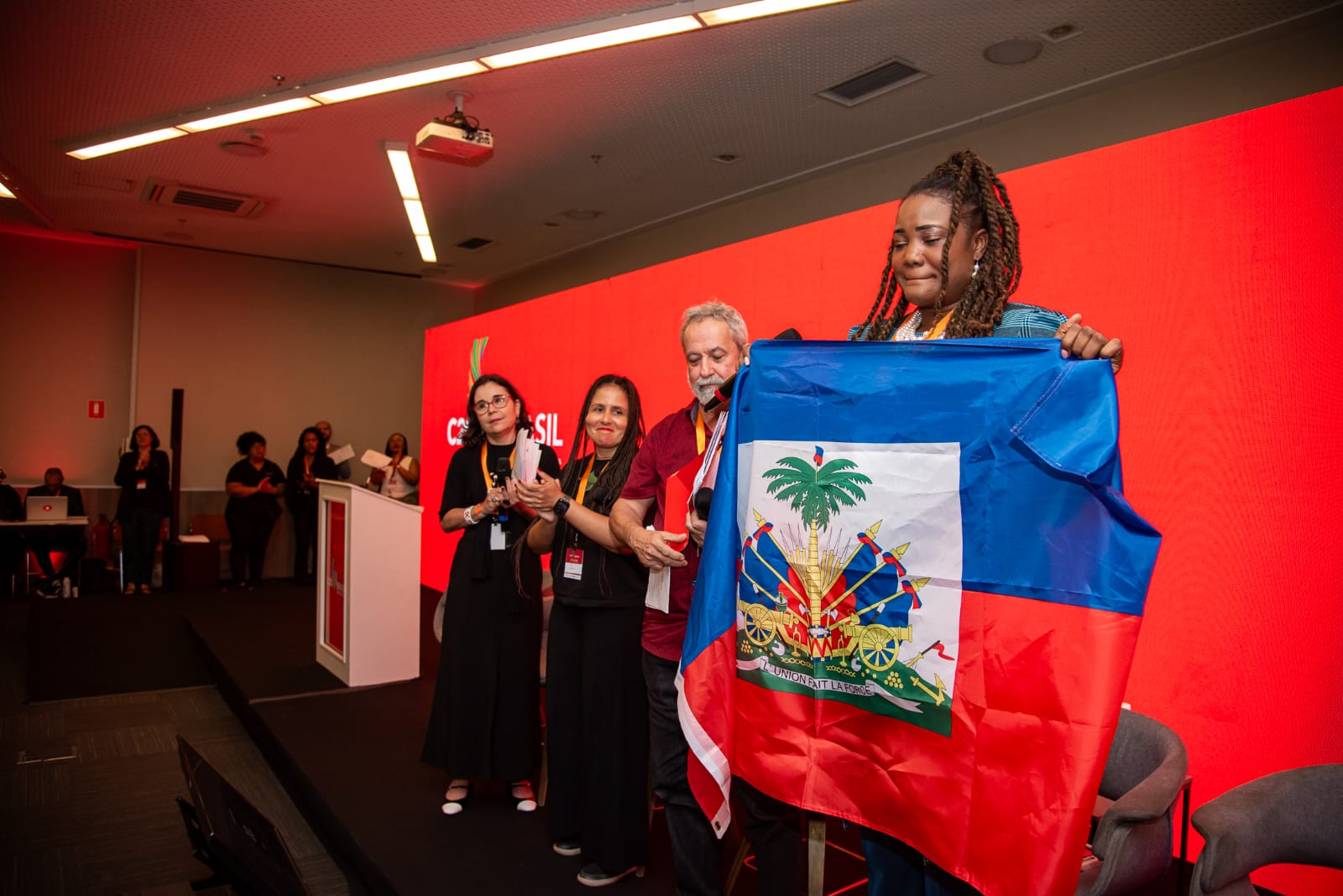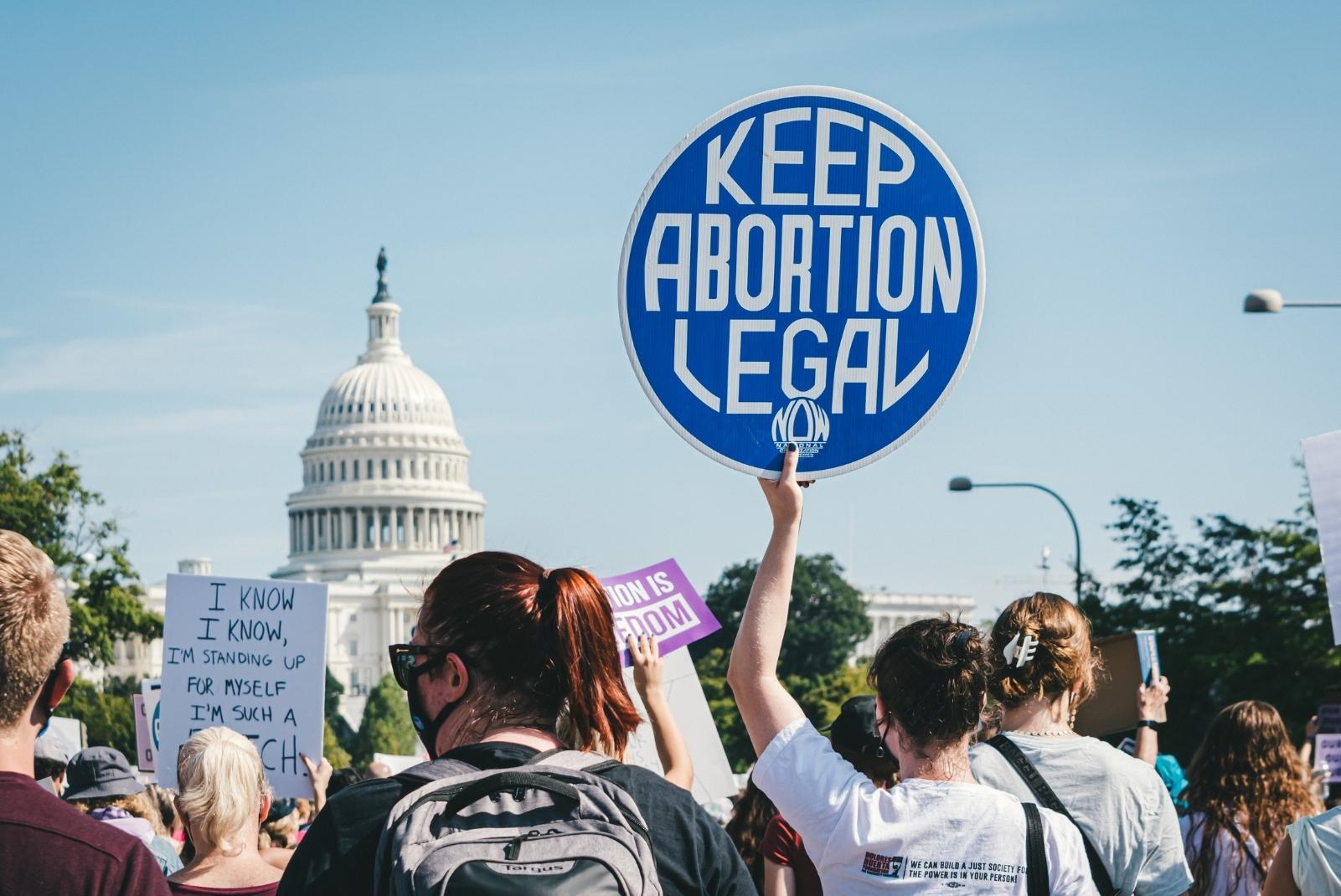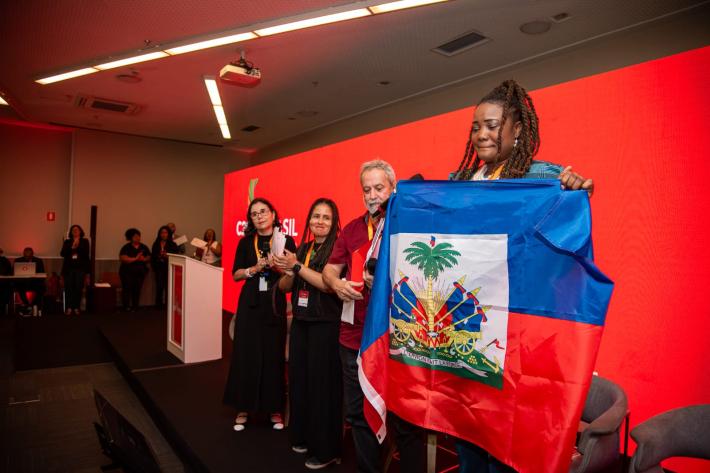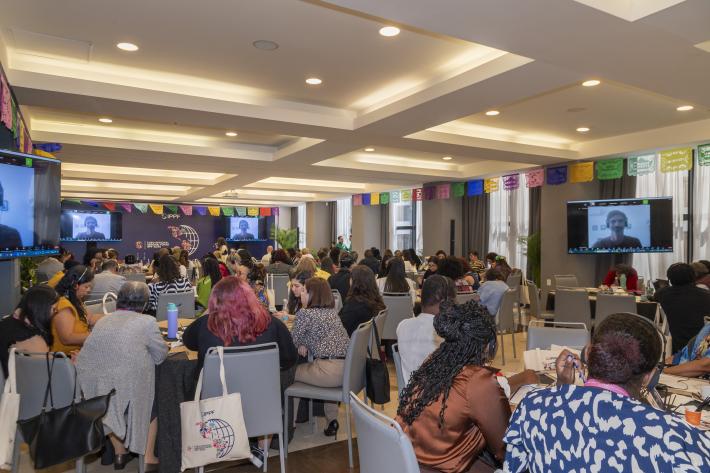Latest press releases
A selection of stories from across the Federation
Americas & the Caribbean
Breaking: IPPF Global Research Exposes Devastating Impact of the Trump Administration
Over Half of Partners and $85 Million Affected
For media enquiries

| 09 April 2025
Breaking: IPPF Global Research Exposes Devastating Impact of the Trump Administration
8 April 2025 – A new global survey of partners conducted by the International Planned Parenthood Federation (IPPF) has revealed the widespread impact of the Trump Administration’s funding cuts, putting essential sexual and reproductive healthcare at risk for millions worldwide. From the responses received, the findings show: 72 Member Associations and Collaborative Partners (62%) currently receive funding from one of the affected sources. Of those that receive core funding from IPPF, over half (57%) are facing funding cuts. This indicates that a significant majority of IPPF’s partners are facing disruptions, impacting access to essential sexual and reproductive health services worldwide. 156 critical healthcare projects are either already terminated or at risk. At least $85.2 million in funding is directly affected or already cut. 1,737 staff members across affected organisations could lose their jobs or already have. 3,961 service delivery points, including clinics and mobile units, are at risk of closure or have already closed. 8.5 million people could lose access to lifesaving SRH services. These funding cuts are expected to have severe consequences on people’s lives for the communities we serve. If all funding at risk is indeed cut, IPPF estimates this will result in an additional 3,844 maternal deaths, over 3 million unintended pregnancies, and 756,010 unsafe abortions. These impacts will also place a heavy financial burden on national health systems. The impact of the Trump Administration’s actions is particularly severe in Africa and South Asia, where many IPPF Member Associations depend on international funding to provide contraception, maternal healthcare, and HIV prevention services. In Venezuela, U.S. funding cuts are projected to slash up to 30% of the Member Association’s 2025 annual budget, with an estimated $229,650 in lost project funding. These cuts will affect 10% of the sexual and reproductive health services provided by the IPPF Member, placing 30% of its staff at risk. Approximately 2,500 clients stand to lose access to care—an alarming number, especially as the organization is among the few still offering services for survivors of sexual and gender-based violence, particularly migrating women and girls. In St. Vincent and the Grenadines, an estimated $10,000 in lost project funding will impact 90% of SVPPA’s sexual and reproductive health services. The organization is facing the potential loss of its entire staff, threatening its ability to operate. With 8 service delivery points at risk, these cuts could eliminate access to vital care, particularly for young people, in one of the country’s few youth-friendly providers. In the United States, independent reports outside of this survey indicate that the Trump Administration intends to freeze funding for affordable contraception and reproductive health care for low-income individuals who rely on Planned Parenthood health centers. To address the immediate crisis, IPPF has launched a Harm Mitigation Task Force to assess the evolving situation and provide emergency funding to its most affected Member Associations and Collaborative Partners. The first round of grants will be issued in April 2025, in an effort to ensure that critical healthcare services and access to life saving health commodities can continue. “We will not allow political decisions to determine who can and cannot access healthcare,” said Dr. Alvaro Bermejo, Director-General of IPPF. “At IPPF, we are doubling down. We are a resilient Federation with a long history of overcoming challenges. Our focus now is on mitigating harm, mobilising new resources, and ensuring that people who rely on us for care are not left behind.” For media inquiries, please contact: [email protected] To support our Emergency Fund for IPPF Member Associations and Collaborative Partners most impacted by the funding cuts, click here. NOTES In February 2025, IPPF launched a survey to hear from its Member Associations and Collaborative Partners about the impact of the actions of the Trump administration. We asked them about programmes cancelled both from direct US sourced funds and indirectly through other impacted sources as well as the effect this would have on their staff, service delivery points, clients served, and SRH commodities. The survey was completed by 117 of IPPF’s 158 Member Associations and Collaborative Partners. IPPF will do a follow-up survey in mid-2025 to assess ongoing impacts, acknowledging that the situation is changing rapidly. Through the survey process, the value reported by MAs and CPs of their current funding affected is at least $48.8 million. This includes funding already lost or funding at risk across affected sources. There is a further $20.9 million in 44 pending proposals that now won’t come to fruition. Additionally, the IPPF Secretariat stands to lose $15.5 million in contracted work. Altogether, IPPF’s total estimated funding affected is $85.2 million.

| 27 March 2025
We condemn Trinidad and Tobago’s Upholding Criminalization of Same-Sex Activity
The Trinidad and Tobago Court of Appeal’s decision to uphold the criminalization of consensual same-sex activity is an alarming assault on human rights. This ruling, which reinstates the criminality of private, consensual intimacy, is a direct violation of the fundamental rights of LGBTQI+ people and a stark reminder of the colonial-era laws that continue to inflict harm across the Caribbean. IPPF Americas and the Caribbean Regional Office (ACRO) together with local member Family Planning Association of Trinidad and Tobago (FPATT) stand unequivocally with LGBTQI+ communities in Trinidad and Tobago and across the region. We reject this ruling and any legislation that denies people their right to love freely and live with dignity. This decision reflects a justice system with oppressive statutes that have no place in a just and democratic society. According to Eugenia López Uribe, Regional Director of IPPF ACRO, this ruling is not just a setback for LGBTQI+ rights, it is an attack on human dignity: “It is a deliberate attempt to silence, criminalize, and exclude a part of citizens and people living in the country. But let this be clear: IPPF regional office in the Americas and the Caribbean will continue fighting for and with the LGBTQI+ movement so they won’t be silenced. IPPF will not back down. LGBTQI+ people’s rights are non-negotiable. " Criminalizing LGBTQI+ lives perpetuate violence, discrimination, and stigma. It emboldens hate, undermines access to justice, and creates a climate of fear where LGBTQI+ individuals are forced to live in further vulnerability. Research published by CAISO: Sex and Gender Justice’s Wholeness and Justice programme in 2023 indicate that 1 in 3 LGBTQI+ individuals in Trinidad and Tobago experience discrimination and harassment, 1 in 4 face family violence, and 1 in 4 experience physical assault. “FPATT [Family Planning Association of Trinidad and Tobago] notes the recent Court of Appeal decision that affirms an old law before independence that criminalizes persons of a different orientation, due to a technicality- the saving law clause,” says Professor Rose Marie Antoine, FPATT’s Board of Trustees President. “Interestingly, the British colonial masters that drafted that law have long abolished it. We note too that this was not a unanimous court decision. FPATT looks forward to the day when our legal system and laws can reflect true equity and non-discrimination, serving all our nation’s peoples in their access to fundamental rights and protecting vulnerable groups from harm and violence. FPATT will continue to welcome and serve all people regardless of their sexual orientation.” We call for urgent action: The immediate repeal of Sections 13 and 16 of the Sexual Offences Act. A commitment from Caribbean governments to decriminalize same-sex relations and protect LGBTQI+ individuals from discrimination and violence. An end to the use of colonial-era "savings law" clauses to justify human rights violations. Now is the time for every human rights defender, policymaker, and ally to take a stand. LGBTQI+ people in Trinidad and Tobago—and across the Caribbean, our region and the world—deserve justice, equality, and the freedom to live without fear. IPPF will not stop until that is a reality. For more information, please contact [email protected] - +44 7918 845944 About the International Planned Parenthood Federation IPPF is a global healthcare provider and a leading advocate of sexual and reproductive health and rights (SRHR) for all. Led by a courageous and determined group of women, IPPF was founded in 1952 at the Third International Planned Parenthood Conference. Today, we are a movement of 158 Member Associations and Collaborative Partners with a presence in over 153 countries. Our work is wide-ranging, including comprehensive sex education, provision of contraceptive, safe abortion, and maternal care and responding to humanitarian crises. We pride ourselves on being local through our members and global through our network. At the heart of our mission is the provision of – and advocacy in support of – integrated healthcare to anyone who needs it regardless of race, gender, sex, income, and crucially no matter how remote.

| 21 January 2025
Our Statement on Trump administration’s decision to withdraw financial support from WHO
January 21, 2025—The International Planned Parenthood Federation (IPPF) strongly condemns the Trump administration’s decision to withdraw financial support from the World Health Organization (WHO). This executive order will have devastating consequences for Americans, global health and the communities we serve. This decision, which gives a one-year notice before taking effect, will severely undermine the WHO’s capacity to carry out its critical mission and will cost lives. As the largest single contributor to the WHO, the United States provides approximately 18% of the organization’s funding, with the current two-year budget for 2024-2025 set at $6.8 billion. The withdrawal of U.S. funding will create an unprecedented financial shortfall, threatening essential health programs, partnerships and global public health. Since its establishment in 1948 as part of the United Nations, the WHO has been at the forefront of global health initiatives. From combatting malaria and tuberculosis to improving women’s and children’s health, nutrition, and sanitation, the WHO’s role in coordinating international health policy, prevention and disease eradication is indispensable. Today, it serves as a vital hub for research, technical support, and health trend monitoring, addressing some of the world’s most pressing health challenges, including sexual and reproductive health and rights. The global maternal mortality ratio has stagnated since 2016 at around 223 maternal deaths per 100 000 live births. Only one WHO region (the South-East Asia Region) has recorded a significant decline in maternal mortality, while all other regions have recorded either a stagnation or an increase. "Defunding the WHO is a direct attack on the health and well-being of millions, especially the most vulnerable,” said Dr Alvaro Bermejo, IPPF’s Director-General. “Donald Trump’s decision to strip the WHO of its funding, before the expansion of the Global Gag Rule, adds further insult to injury. The health community has collectively endured unprecedented attacks against health care workers, patients and clinics, made possible with the previous US administration. Peace is the best medicine; we urge the Trump Administration to reconsider its position. The world needs a thriving WHO. Women, girls and LGBTQ+ people all over the world need a thriving IPPF. IPPF stands in solidarity with Dr Tedros Adhanom Ghebreyesus and with the WHO. We will continue to resist, and we will continue to fight for peace, and for sexual and reproductive health, rights and justice for ALL.” IPPF calls on the international community to stand in solidarity with the WHO and to work together to mitigate the catastrophic impact of this funding withdrawal. The lives and health of countless individuals are at stake, and we must act urgently to ensure that global health systems remain strong and resilient. For more information please contact [email protected] About the International Planned Parenthood Federation IPPF is a global healthcare provider and a leading advocate of sexual and reproductive health and rights (SRHR) for all. Led by a courageous and determined group of women, IPPF was founded in 1952 at the Third International Planned Parenthood Conference. Today, we are a movement of 158 Member Associations and Collaborative Partners with a presence in over 153 countries. Our work is wide-ranging, including comprehensive sex education, provision of contraceptive, safe abortion, and maternal care and responding to humanitarian crises. We pride ourselves on being local through our members and global through our network. At the heart of our mission is the provision of – and advocacy in support of – integrated healthcare to anyone who needs it regardless of race, gender, sex, income, and crucially no matter how remote.

| 25 November 2024
IPPF ACRO Launches 16 Days of Action Campaign: What Kind Of Man Are You?
Haz click aquí para leer este comunicado en español. Port of Spain, November 25, 2024- The International Planned Parenthood Federation Regional Office in the Americas and the Caribbean (IPPF ACRO) proudly announces the launch of the campaign “What Kind of Man Are You?”, aimed at engaging men and boys across the Caribbean to take an active role in eliminating violence against women. This initiative, developed in collaboration with a Caribbean taskforce, emphasizes the importance of young men becoming allies in building a safer, more just society for all. “We want men and boys to feel empowered to be part of the solution,” said Eugenia Lopez Uribe, Regional Director of IPPF ACRO. “This campaign speaks directly to the men we care about, inspiring them to step up and join us in creating a world where women can live free from violence. A world of social justice cannot exist without their active participation.” The campaign highlights that violence against women is a crisis that deeply affects the Caribbean region. According to UNFPA Caribbean, 27–40% of women in countries like Grenada, Guyana, Jamaica, Suriname, and Trinidad & Tobago have reported experiencing violence at the hands of their partners. The forms of violence are wide-ranging and include intimate partner violence, domestic violence, and sexual violence. Traditionally, campaigns addressing violence against women have positioned men as bystanders or perpetrators rather than allies. "What Kind of Man Are You?" flips this narrative, calling on men to become their best selves—not only for the women they care about but for their entire communities. Through this campaign, IPPF ACRO emphasizes that building a world free of violence requires the participation of everyone, especially men who want to ensure better futures for their daughters, wives, sisters, and friends. The campaign is launched to coincide with the International Day for the Elimination of Violence Against Women on November 25, marking the beginning of the 16 Days of Activism Against Gender-Based Violence. This annual campaign runs until December 10, International Human Rights Day, and calls for global action to end atrocities such as intimate partner violence, digital violence, child marriage, female genital mutilation, and rape. IPPF ACRO, alongside its partners in Antigua and Barbuda, Aruba, Barbados, Bermuda, Cuba, Curaçao, Dominica, Grenada, Guadeloupe, Haiti, Jamaica, St. Lucia, St. Vincent & the Grenadines, and Trinidad & Tobago, has a longstanding commitment to preventing and addressing sexual and gender-based violence. Together, they provide essential services, including safe shelters, counseling, and prevention and response programs for survivors. For media inquiries or further information about the campaign, please contact: Andrea Alcalá, Communications, Voice, and Media Officer, IPPF ACRO at [email protected], or +52 33 1409 6790.

| 13 November 2024
IPPF ACRO Urges G20 for Action on Haiti
Rio de Janeiro, November 2024 – The International Planned Parenthood Federation’s Americas and the Caribbean Regional Office (IPPF ACRO) has been at the forefront of advocacy efforts, urging the G20 to address the escalating crisis in Haiti. During the Civil 20 (C20) Engagement Group discussions, IPPF ACRO played a key role in driving forward a joint statement that calls on the G20, under Brazil’s presidency, to take decisive action to support Haiti amidst its deepening humanitarian emergencies. The statement, delivered to Brazilian President Luiz Inácio Lula da Silva, highlights the alarming political instability and escalating violence in Haiti, which have severely impacted vulnerable populations. According to the International Organization for Migration (IOM), at least 35,000 people have fled their homes since early 2024, and over 600,000 Haitians are now displaced. The compounded crises have severely threatened fundamental rights, particularly the sexual and reproductive health and rights of women and girls in all their diversity, who face heightened risks of gender-based violence. Throughout this year, IPPF ACRO has consistently championed the inclusion of Haiti’s crisis on the G20 agenda. “The situation in Haiti is a stark reminder of the vulnerabilities faced by the Caribbean in the face of climate change, political instability, and deep-seated inequality,” said Alessandra Nilo, C20 Sherpa and IPPF ACRO’s External Relations Director. “We pushed for this statement because it is imperative that the G20, especially under Brazil’s leadership, acknowledges the urgent need for action. Women and girls in Haiti are bearing the brunt of this crisis, and they cannot wait any longer for the international community to act.” Jeffthanie Mathurin, midwife, Member of the Board of Trustees and spokesperson of the Midwife Association of Haiti, IPPF Member Association in the country, further emphasized the urgency of the situation: “The time has come for social solidarity to transition from words to actions, from statements to safeguards, from declarations to transformations. Stand with Haiti, stand with our midwives, with our women and girls, and with every community affected by this crisis. Together, let us ensure that our shared humanity does not turn into a fleeting ideal, but rather a strong force for peace, dignity, and justice for all Haitians.” IPPF ACRO remains committed to centering the voices of local organizations and communities in the response to Haiti’s crisis. “We believe in a response that prioritizes the rights and needs of those most affected, particularly in access to critical maternal health care and sexual and reproductive health services,” emphasized Eugenia López Uribe, Regional Director of IPPF ACRO. “We call on the G20 leaders to recognize that true resilience and recovery for Haiti must be rooted in ensuring the fundamental rights of its people, especially women and girls.” The joint statement by the C20, Women 20, and Labour 20 Engagement Groups calls on the G20 to speak out in favor of restructuring Haiti’s healthcare system, including essential maternal health care and sexual and reproductive health services. The statement urges G20 leaders to include a commitment in the official Communiqué for zero tolerance towards sexual and gender-based violence and immediate protection measures for women, children, and those most at risk in Haiti. “At a time of multiple global crises, we cannot forget Haiti,” added Nilo. “Decades of colonial exploitation, compounded by climate impacts, have created the conditions for today’s instability. The G20 must step up and commit to a future where human rights are protected, and no one is left behind.” About the International Planned Parenthood Federation (IPPF) and the Americas & the Caribbean Regional Office (IPPF ACRO) IPPF is a global healthcare provider and a leading advocate of sexual and reproductive health and rights (SRHR) for all. Led by a courageous and determined group of women, IPPF was founded in 1952 at the Third International Planned Parenthood Conference. Today, we are a movement of 150 Member Associations and Collaborative Partners with a presence in over 146 countries. we have focused our work on advocating for sexual and reproductive health and rights across the region, with a special focus on abortion, contraception, maternal health, comprehensive sexuality education, child marriage and early unions, LGBTQ+ people, and HIV care. At the IPPF Americas and the Caribbean Regional Office (IPPF ACRO), we take pride in being local through our Member Associations and Collaborative Partners ,present in 30 countries of our region: Antigua & Barbuda, Argentina, Aruba, Bahamas, Barbados, Bolivia, Brazil, Canada, Chile, Colombia, Cuba, Curaçao, Dominica, Ecuador, Guadalupe, Guatemala, Granada, Guyana, Haïti, Honduras, Jamaica, Mexico, Paraguay, Peru, St. Lucia, St Vincent & the Grenadines, Suriname, Trinidad & Tobago, and the United States of America. For more information: Andrea Alcalá Frutos +52 (33) 1409 6790

| 06 November 2024
The Fight for Reproductive Rights Continues
The Fight for Reproductive Rights Continues Today, we recognize the steadfast advocates for people’s rights, particularly reproductive rights, who showed up to vote in the U.S. elections, exercising their power to affirm bodily autonomy and defend freedom. In Arizona, Colorado, Maryland, Missouri, Montana, Nevada, and New York, voters upheld reproductive freedom. Their votes are a testament to an enduring commitment to safeguarding reproductive rights and personal agency over one's body, life, and future. We also commend the tremendous work of the Planned Parenthood Federation of America, our dedicated Member Association in the U.S., whose tireless campaigning has highlighted what was at stake in this pivotal election. Their unwavering advocacy has empowered countless individuals to protect and advance our shared values. We know this is a moment to be concerned. The outcome of this election deals a heavy blow to the Sexual and Reproductive Rights Movement. IPPF anticipates significant setbacks, including funding reductions and workforce cuts impacting SRHR defenders globally. This election result is devastating for the millions who will rely on sexual and reproductive health care over the coming years and beyond. But it is exactly because of this that we need to be stronger than ever: many more people will need us. Therefore, let’s assure the world that IPPF Member Associations and Collaborative Partners across the Americas and the Caribbean remain resolute in our mission to ensure comprehensive sexual and reproductive health and rights for all. Let there be no doubt: we will continue the fight for our right to make autonomous decisions about our reproductive lives, to live our sexuality freely, and to access inclusive health services that meet the diverse needs of our communities, whether in contraception, fertility, transgender care, HIV prevention and care, or beyond. And we will continue to strengthen our alliances with progressive social movements around the region and the globe. In this critical moment, we call on all governments, donors, and international agencies to step up in the face of the upcoming assaults on human rights that will come with the Trump administration, because activists, communities, and civil society organizations are on the frontlines but should not fight these battles alone. This is an election that particularly affects the Latin American and Caribbean region. We are part of the Green Wave, and we won’t give up. Therefore, it is time to intensify efforts and demand fully funded social movements, including sustained funding for our SRHR champions and their unwavering efforts to counter the ongoing attacks on rights in the field. Now more than ever, it is imperative to support those defending bodily autonomy and freedom, ensuring they have the resources and backing required to resist, persist, and advance the rights of all people. We will not be deterred. Our commitment to the millions of people we assist and support, communities, and allies stands firm. Together, we will continue to resist and build a world where everyone can live free from violence and fully exercise their right to shape their present and future. Image credit: BBC
















